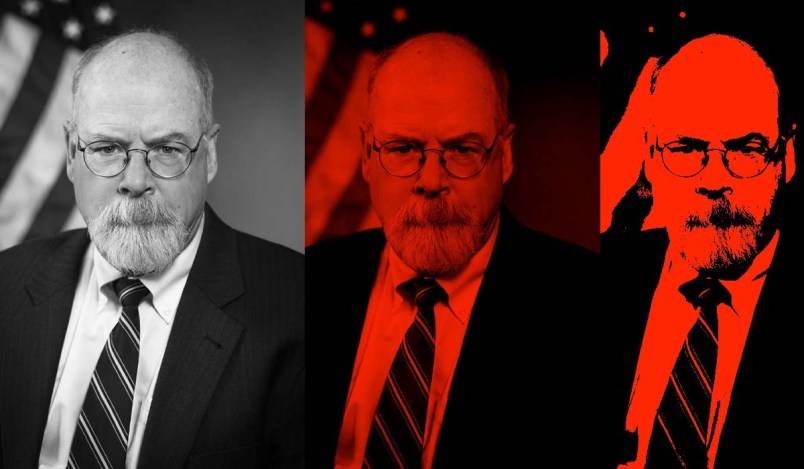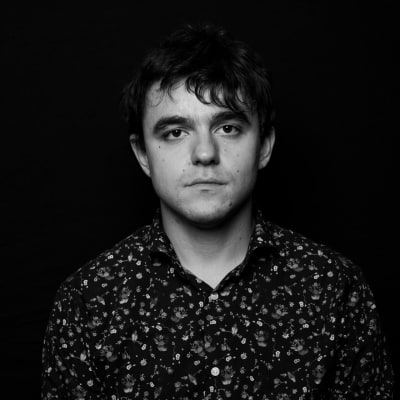Michael Sussmann, the Democratic-aligned attorney, was indicted in September 2021, days before the five-year statute of limitations would have expired.
The charge is narrow, and has generated outrage for the bizarre circumstances under which Special Counsel John Durham, appointed by Attorney General Bill Barr, brought it.
Durham alleged that Sussmann lied to the FBI on Sept. 19, 2016, accusing the attorney of misleading the bureau’s general counsel about one thing: whether he was delivering information on behalf of a client, or independently.
Prosecutors working for Durham contend that Sussmann lied, and that he — while secretly in the employ of the Clinton campaign and a tech executive named Rodney Joffe — sent the FBI on a wild goose chase that morphed into the grander tale of Trump-Russia collusion.
Assistant U.S. Attorney Andrew DeFilippis, a Durham prosecutor, described Sussmann’s alleged crime as part of a bigger conspiracy to drum up press attention about links to Russia, “get the government to investigate it,” and then to “get the press to report the government was investigating.”
Sussmann, who has suggested that the prosecution is politically motivated, goes to trial on Monday. The trial is not so much a test of Durham’s unified theory of the Trump-Russia scandal, but, rather, an examination of whether a charge on such a narrow and arcane topic will pass muster with a jury, potentially spurring Durham to issue further indictments.
Origin story
Barr first appointed Durham in May 2019 to conduct a noncriminal review of the origins of the Trump-Russia investigation. It was in the immediate aftermath of the end of the Mueller investigation, with Trump supporters — and his spokesperson — calling to investigate the investigators.
“After two years of [investigations] and being vindicated, and now in fact the tables are turning in that the investigators will be investigated, there’s a certain amount of righteous indignation that’s warranted,” Tim Murtaugh, Trump’s communications director, said at the time.
Barr upgraded Durham’s appointment, giving him special counsel status weeks before the 2020 election. Since then, the former Connecticut U.S. Attorney has brought two cases: Sussmann, and that of a D.C. researcher involved in the Steele dossier.
Targeting Sussmann
Sussmann’s indictment and subsequent arguments from Durham’s team have breathed new life into conspiracy theories on the right
Much of this has to do with Durham’s own choices in writing the indictment: the document includes long, uncharged descriptions of alleged wrongdoing by Joffe, the tech executive, and of the supposed involvement of the Clinton campaign. It’s not until page 18 of the document that we arrive at the alleged crime: Sussmann allegedly telling FBI General Counsel James Baker that he was not offering information “on behalf of any client.”
The tip that Sussmann offered had to do with analysis of internet data which he said showed a Trump Organization server was secretly communicating with Alfa Bank, a Russian-owned financial institution. Those claims have mostly been discredited.
‘Not charged with a conspiracy’
On the narrow claim of false statements, Durham has produced a text message in which Sussmann told Baker, “I’m coming on my own — not on behalf of a client or company — want to help the bureau.”
But the prosecution has been suffused with claims of a broader conspiracy that far outstrip the narrowness of the crime for which Sussmann was charged.
“Mr. Sussmann is not charged with a conspiracy,” U.S. District Judge Christopher Cooper for the District of Columbia, the presiding judge in the case, recently wrote in an order laying out what evidence can be presented at trial.
In that decision, Cooper blocked evidence that Sussmann was part of a so-called “joint venture” that involved the Clinton Campaign, investigations firm Fusion GPS, and others.
“While the Special Counsel has proffered some evidence of a collective effort to disseminate the purported link between Trump and Alfa Bank to the press and others, the contours of this venture and its participants are not entirely obvious,” Cooper wrote.
Cooper did allow other, broad categories of evidence to make it to trial: part of Sussmann’s argument has been that the question of whether he was there on behalf of a client wasn’t material to the FBI’s investigation. A lie has to have a material impact on government function to be considered a crime.
Cooper has allowed Durham to present some evidence in favor of that, including emails from Fusion GPS and other internet researchers urging reporters to write about the story because, in Cooper’s words, they go to the “ultimate goal of disseminating the Alfa Bank allegations to the press.”
Sussmann prepares for trial
Sussmann, for his side, has sought to call former New York Times reporter Eric Lichtblau testify. Lichtblau wrote an October 2016 article that Durham referenced in the indictment. The article claims that the FBI saw “no clear link to Russia.”
Lichtblau had also communicated with Sussmann one month earlier — right before he allegedly made the lie to the FBI.
Lichtblau, in concert with New York Times attorneys, has agreed to testify — so long as the questioning remains limited to Lichtblau’s discussions with Sussmann.
Durham, however, appears to have objected to that. Per a filing from Lichtblau, Durham not only wants to retain the right to question the former reporter about other interactions apart from those with Sussmann, the investigation has already obtained some “communications” involving Lichtblau and others.
“The prosecution might want to examine Mr. Lichtblau about other, unknown aspects of his reporting,” Lichtblau wrote in the filing, relaying what a Durham prosector purportedly told him.
The trial begins on Monday. If Durham secures a win, it’s not clear what would come next.
As Harry Sandick, a former federal prosecutor, told me, the case that Durham made against Sussmann doesn’t quite match up with traditional up-the-chain prosecutions, in which lower-level defendants flip on higher-ups.
““It seems to me less like a logical first step in an up-the-chain prosecution, and more like an attempt by a prosecutor to justify a tremendous amount of time and expense in an investigation,” he said.










